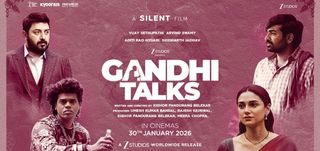Devaki Movie Review
Once in a while, someone decides to do a reality check, and make a film about an event that disturbs him or her. Devaki is one such film, based on a true story from rural India, where a woman was sold off for a price of Rs: 5000/-. It is indeed appalling that even today, though we consider ourselves evolved and civilized, such things do happen. And it is to the director’s credit that he has gone ahead and made a film on this subject, knowing fully well that such a film probably will not fetch him much returns commercially.
Devaki is the story of two women, Nandini (Perizaad Zorabian) and Devaki (Suman Ranganathan). Nandini is a city bred modern day girl, whose father has left her and her mother years ago. Tired of leading an unsatisfying life in the city, she joins an NGO and goes into the village, to try and educate the villagers. Here, she instantly bonds to Devaki, a lower caste uneducated girl. Devaki too is overawed by Nandini, and looks up to her for everything.
Devaki’s father, because of his poverty is forced to marry her off to an old, impotent seventy year old. Nandini tries in vain to stop the marriage. Nandini goes back to the city, where her mentally ill mother and her two timing boyfriend await her. She finds a job in her estranged father’s firm. The two women keep in touch with each other by post. Devaki is subject to rape and humiliation in the village, with the connivance of her husband and his previous three wives. She falls for a lower caste boy of her age, for which she is severely punished and auctioned off.
On the other hand, Nandini undergoes an equal amount of humiliation and despair in the city, as she realises that women’s plight everywhere is more or less the same. Her condition is as good or as bad as that of Devaki. The film ends with Devaki getting punished and being auctioned off to the highest bidder, and Nandini being asked to sell herself and her morals, by her own father.
The film, which runs for 100 minutes (mostly in English), has received plenty of nominations and recognitions abroad, though it has had a delayed release here. The film is slow, and drags in parts. The idea of drawing a parallel, between the lives of women in rural and urban India is a very good one, and will definitely make all of us think whether we have really evolved and matured as much as we think we have.
The film lacks technical finesse, and could do with an overall improvement in the sound and voicing department. Of the cast, both Perizaad and Suman deliver excellent performances, while Arvin Tucker is badly cast, as he is too anglicised and Westernised to pass off as a lower caste rebel. The rest of the cast is well chosen, and the village milieu is well created.
The film is very likely to make one sit up and think, and those among us who are socially conscious and active will definitely like to take up cudgels on issues such as this. Unfortunately, the film has no great commercial value, and is likely to disappear from the theatres without much of a whimper.



















